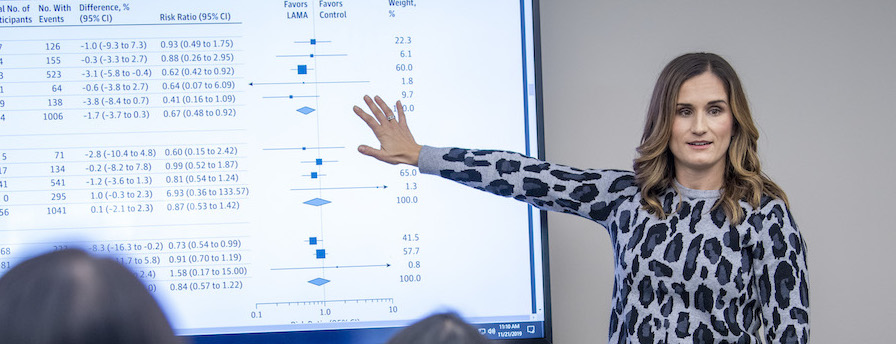
The School of Pharmacy's Department of Pharmacy Practice offers a variety of residencies and research fellowships. These highly individualized postgraduate training programs are designed to prepare the participant to become an independent researcher and a clinical scientist.
Residencies versus Fellowships
In contrast to a residency, where the emphasis is on the development of practice skills, a fellowship is focused on the development of research skills. This training will prepare successful candidates to qualify for faculty positions in academic settings and research positions in the private sector, as well as numerous other opportunities that utilize the scientific and critical thinking skills obtained through this experience.
Over the term of the appointment, fellows generally devote the majority of their training efforts to scholarly activities – predominantly research and relevant coursework, and the remainder to a mixture of clinical, teaching and administrative responsibilities.
Department of Pharmacy Practice - Residencies and Fellowships
The Department of Pharmacy Practice offers the following graduate level training experiences. Please see the different categories below for more information. If you are interested in applying to a residency or fellowship, please contact the preceptor noted.
The Health Outcomes Research Fellowship
Candidates to this two-year fellowship must be eligible for pharmacist licensure in the state of Connecticut and possess a strong interest in learning how to execute outcomes-based research from inception to publication in the peer-reviewed literature. Although the core preceptor team has a strong record of cardiovascular-based outcomes research, health topics vary throughout the duration of the fellowship.
The fellow will devote a minimum of 80% effort to scholarly activities. During this time, fellows will work directly with the program preceptors to learn how to execute outcomes-based research. Methodology for the execution of observational studies and systematic reviews and meta-analysis are central to the fellowship while additional experiences could be available. Fellows will work with their preceptor through various components of the research studies including protocol development, project management, data analysis, scientific writing and presentation of findings at national and international meetings. Our goal is that by the end of the 2-year fellowship, the fellow has been immersed in pertinent research that provided skills that can be successfully applied to pursue an independent research career. Our fellows most commonly pursue and obtain positions within academia or the pharmaceutical industry.
Outside of scholarly activities, fellows participate in teaching and service-related activities associated with the academic role of their fellowship preceptors at the University of Connecticut School of Pharmacy. Such activities include, but are not limited to, delivery of didactic lectures, small group/laboratory-based facilitation, and co-precepting experiential education.
Primary Preceptors:
Michael White, Pharm.D.
Craig I. Coleman, Pharm.D.
Pediatric Antimicrobial Stewardship Pharmacy Fellowship
The Pediatric Antimicrobial Stewardship Pharmacy Fellowship is a 24-month experience to foster the fellow’s ability to lead a pediatric antimicrobial stewardship program and practice as a faculty member at a school of pharmacy. The fellow will be highly involved in creation, design, and analysis of antimicrobial stewardship related projects and clinical teaching. Please visit the Pediatric Antimicrobial Stewardship Pharmacy Fellowship for more details on this program.